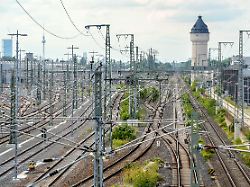Budget freeze threatens mega project
EVG demands commitment for billion-dollar railway renovation
November 26, 2023, 10:25 p.m
The ailing rail network should be made fit with around 40 billion euros over the next few years. The debt brake ruling from Karlsruhe is now causing delays in operations. After the Ministry of Finance blocked the budget, the EVG warned the federal government not to call off the restructuring.
The Railway and Transport Union (EVG) has called on the federal government to ensure billions in investments in rail infrastructure despite the ruling from Karlsruhe. “Without these investments, the general renovation is on the brink,” said EVG chairman Martin Burkert to the “Frankfurter Allgemeine Zeitung”. The already announced railway renovation must come, otherwise “there is a risk of transport and climate policy collapse,” the trade unionist told the newspaper.
The green transport politician Matthias Gastel also recalled that the traffic light coalition was set up to enable reliable, long-term and adequate financing of the rail infrastructure. “It now needs clarity that the necessary investments in a low-disruption and efficient rail network can be tackled as planned,” Gastel told the newspaper.
Economists see equity increases as a way out
After the Federal Constitutional Court’s landmark ruling on the debt brake, Federal Finance Minister Christian Lindner put all financial commitments to Deutsche Bahn to the test. This involves a total of almost 40 billion euros in funds over the next four years. Of this, 12.5 billion euros should come from the climate and transformation fund, which has been declared unconstitutional. According to the FAZ, a significant part should be paid for through equity increases, which are now also being blocked by the Federal Ministry of Finance. According to a report from the ministry, all effects on the federal budget are currently being examined in light of the ruling.
Constitutional experts and economists consider this part to be legally unproblematic. The Heidelberg constitutional law professor Hanno Kube, who won the judgment for the Union in Karlsruhe, explained to the FAZ that an equity increase as a financial transaction has no impact on the debt brake. Because the state ultimately gets something for the money it invests in the rail network, he emphasized. Lindner’s chief economist Lars Feld also confirmed to the FAZ that the billions for the urgently needed railway renovation could be raised through an equity increase.
The railway had previously pointed out the urgency. In the now closed climate and transformation fund, four billion euros were planned for rail infrastructure for the coming year alone, and by 2027 it will be 12.5 billion euros. If the financing is not clarified, “the goals of shifting transport to rail cannot be achieved under any circumstances,” a railway spokeswoman told the Germany editorial network on Friday.
